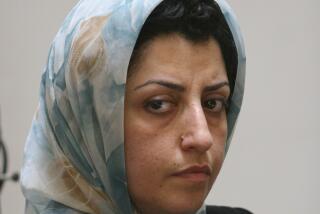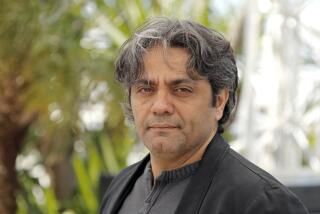Saudi women’s rights activist released from prison, family says

After 1,001 days in prison, Saudi women’s rights activist Loujain Hathloul was released Wednesday, members of her family said, ending a detention that had become a public relations millstone for the kingdom and its de facto ruler, Crown Prince Mohammed bin Salman.
Hathloul, 31, came to prominence after defying a ban on women driving. She had been in custody since May 2018, after she and more than 10 other women’s rights activists were swept up in a wide-scale security campaign targeting dissent in the kingdom. Her arrest came weeks before Mohammed overturned the ban.
“This is the best day of my life, Loujain is in my parents’ house,” tweeted Hathloul’s sister, Alia. Another sister, Lina, tweeted a picture of Hathloul smiling in front of a bougainvillea plant, saying she was at home.
In December, the Specialized Criminal Court in the Saudi capital, Riyadh, which specifically deals with terrorism cases, sentenced Hathloul to five years and eight months for what local media said were “various activities prohibited by the anti-terrorism law,” including “inciting to change the system of rule” and seeking to serve “foreign agendas,” according to the media outlet Sabaq News.
A government spokesman later said that two years and 10 months had been suspended in addition to time already served in prison, opening the path for her to be released this week. Also released was Nouf Abdulaziz, a journalist and human rights activist seized in the same dragnet as Hathloul.
Though Hathloul was out of prison, she nevertheless will remain on probation and is subject to a five-year travel ban that prohibits her from leaving Saudi Arabia; she also is awaiting news of the appeal process, sister Lina said Tuesday.
During her nearly three years behind bars, Hathloul became a lightning rod for what critics contend are the heavy-handed abuses that have come to characterize Mohammed’s rule. Allegations that Hathloul was tortured in prison by the crown prince’s lieutenants — an accusation authorities deny — spurred global condemnation of the kingdom.
In October 2018, journalist Jamal Khashoggi was killed and dismembered in an operation believed to have been ordered by Mohammed, who has denied knowledge of the slaying. Along with Hathloul’s incarceration, it came to symbolize the crown prince’s intolerance for even mild-mannered opposition against his leadership. It also cast a long shadow on Mohammed’s attempts to woo Western support for those reform programs.
“Saudi women’s rights defender Loujain al-Hathloul should never have been imprisoned. “The supposedly ‘reformist’ Saudi crown prince jailed her for demanding her rights,” tweeted Kenneth Roth, executive director of Human Rights Watch, hours after Hathloul’s release. “Still, let’s celebrate that she has now, at long last, been released.”
Lynn Maalouf, Amnesty International’s Middle East research director, said Hathloul’s release was long overdue.
“Nothing can make up for the cruel treatment she has suffered, nor the injustice of her imprisonment. During her time in prison she was tortured and sexually harassed, held in solitary confinement and was denied access to her family for months at a time,” Maalouf said. “Saudi Arabia’s authorities must ensure those responsible for her torture and other ill-treatment are brought to justice. They must also ensure she is not subjected to any further punitive measures such as a travel ban.”
Hathloul’s release comes as part of an attempt to charm President Biden and a U.S. administration less tolerant of Mohammed’s excesses, analysts said.
“As soon as it became clear that Biden was the winner in the election, [the Saudis] fast-tracked these show trials and handed down almost uniform judgments where they convicted them but suspended a lot of the sentence,” Adam Coogle, deputy director for the Middle East for Human Rights Watch, said in an interview Wednesday.
In January, Saudi Arabia announced legal reforms had reduced executions by 85%. Last week, Saudi authorities released two activists with U.S. citizenship, Bader Ibrahim, a journalist, and Salah Haidar, a media commentator, on bail pending their trials.
More to Read
Sign up for Essential California
The most important California stories and recommendations in your inbox every morning.
You may occasionally receive promotional content from the Los Angeles Times.






